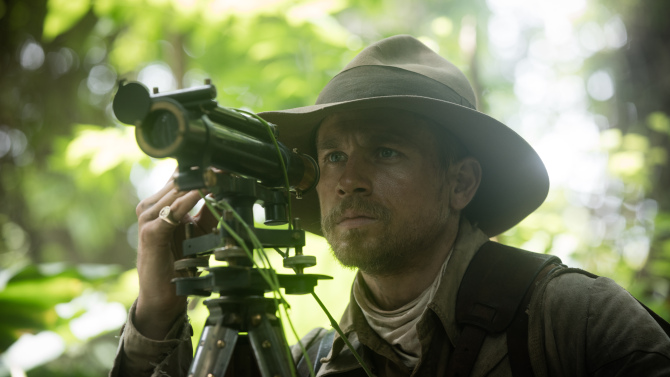
James Gray’s resplendent, symphonic Lost City of Z, adapted from David Grann’s 2009 nonfiction book, is the kind of grand adventure epic few people know how to make anymore, a movie whose beginning—in staid Edwardian Great Britain—takes place a world away from its eerie, dreamlike ending. Charlie Hunnam stars as real-life British explorer Percy Fawcett, who, in 1925, disappeared in the Amazonian jungle while seeking a long-lost civilization. Others doubted its existence, but Fawcett was sure in his bones, and in his heart, that it was real. He devoted his life to locating it.
In The Lost City of Z, Fawcett—an anthropologist and an undecorated colonel in the Royal Artillery—gets his first inkling of this mythical outpost while on a fairly routine, if still dangerous, Amazon mapping expedition in 1906. The indigenous guide accompanying him, Tadjui (Pedro Coello), hints at the legend of a “beautiful city of gold and maize, deep in the forest.” Not long after, Fawcett glimpses a carved face nestled in a tree trunk, guarded by a growling panther. Already he’s lost—yet also found.
Tadjui has told him, “For you, there is no escape from the jungle,” and that turns out to be true. The Lost City of Z is a story of obsession, but not one of folly. Fawcett’s quest—he insists on returning to the Amazon, defying the stuffed-shirt British explorer types who pooh-pooh his notions—is framed as a spiritual one, the result of a small idea that slips into a person’s bloodstream and never slips out. Gray—whose last picture was The Immigrant, a gorgeous and passionate picture in which Marion Cotillard played another kind of adventurer, a young woman forging a new life for herself on hostile shores—does nothing by half measures, and that goes for his exploration of Fawcett’s jungle, too. With ace cinematographer Darius Khondji, he captures the wonders and horrors of this mystery mirror-world Eden: Squeaky bats flapping through tree boughs for their nighttime flight, illnesses that cause bold, sturdy men to cough up black gunk, a sacred hillside ritual illuminated by the grace of flickering torches.
Gray’s movies are hugely popular with French critics and audiences. He has passionate defenders in the States, but his pictures are never greeted with the awe reserved for, say, noted auteur types like Terrence Malick or Wes Anderson. That could be because Gray’s pictures are sometimes bracingly out of style. He’s an old-school craftsman, an heir to filmmakers like George Stevens (Shane, A Place in the Sun)—his movies are intimate and expansive at once, and he has a love for, and an understanding of, melodrama: He’s unafraid of intense emotions, written out in a filmmaking language that’s bold yet fine-grained, and audiences today seem to have lost touch with that vocabulary.
It’s to Gray’s credit that he keeps speaking it, and with a more nuanced degree of artistry each time. His actors reach out to meet him: As Fawcett, Hunnam is noble without being unbearable, summoning the perfect blend of ardor and understatement. Robert Pattinson is wonderful as Henry Costin, Fawcett’s solemn, bearded, no-nonsense aide-de-camp. We barely see his eyes—they’re half hidden by small John Lennon-style glasses—but his bearing alone tells us what he’s thinking every minute. Sienna Miller, luminous and astute, is Fawcett’s wife Nina, who supports his outsized dreams even as the couple’s eldest son, Jack (Tom Holland, soon to be seen in the Spider-Man reboot), nurses boyish resentments. This is a family drama, too, and the intricate dynamics of the Fawcetts’ marriage, and Jack’s relationship with his father, unspool in a way that’s both believable and moving.
Gray can tell a whole backstory with just one shot. In an early scene, we see Fawcett’s red officer’s uniform laid out on a bed, looking soft and regal by lamplight, ready for the fancy ball he’s about to attend with his wife. A Jack Russell terrier runs up and performs a cursory, interrogatory sniff. It’s a tableau that both outlines what’s expected of a gentleman and shows how false it all is: The handsome-looking uniform means nothing without a body in it. The aristocratic-looking dog is really just a classic maker of mischief. In one of the most wondrous scenes, Fawcett and his team of Amazon explorers communicate with a frightened and aggressive tribe of Indians by breaking into a celebratory popular song of the day, “Soldiers of the Queen,” accompanied by concertina: Music speaks not only louder than words, but better. Pictures with the grand sweep and dreamy energy of The Lost City of Z don’t come along every year—they barely come along at all. This is itself a message in a bottle, a missive from a lost city of movies.
More Must-Reads from TIME
- Donald Trump Is TIME's 2024 Person of the Year
- Why We Chose Trump as Person of the Year
- Is Intermittent Fasting Good or Bad for You?
- The 100 Must-Read Books of 2024
- The 20 Best Christmas TV Episodes
- Column: If Optimism Feels Ridiculous Now, Try Hope
- The Future of Climate Action Is Trade Policy
- Merle Bombardieri Is Helping People Make the Baby Decision
Contact us at letters@time.com